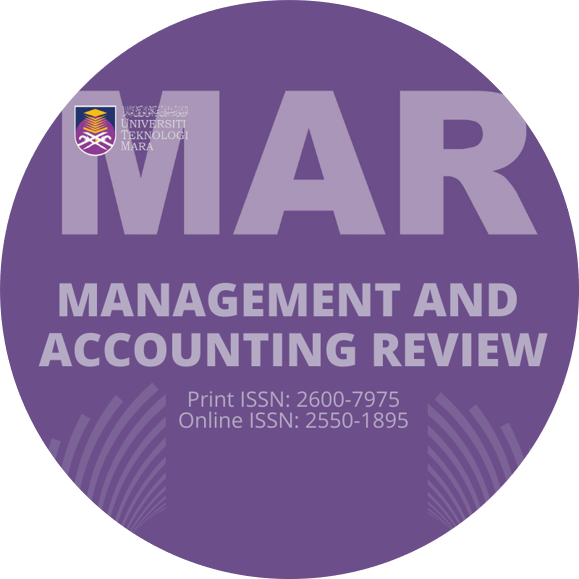Volume 21 No. 3, December 2022
ARTICLE INFO
Article History:
Received: 29 April 2022
Accepted: 25 August 2022
Available online: 01 December 2022
MANAGEMENT AND ACCOUNTING REVIEW, VOLUME 21 NO 3, DECEMBER 2022
https://doi.org/10.24191/MAR.V21i03-12
https://doi.org/10.24191/MAR.V21i03-12
MALAYSIAN HOUSEHOLD DEBT: THE IMPACT OF COVID-19 ON NON-PERFORMING FINANCING
Wahida Ahmad1♣, Nur Hazimah Amran2, and Sharazad Haris3
1Arshad Ayub Graduate Business School, Universiti Teknologi MARA, 40450 Shah Alam, Selangor, Malaysia
2Department of Postgraduate and Professional Studies, Faculty of Business and Management, Universiti Teknologi MARA, 40450 Shah Alam, Selangor, Malaysia
3Faculty of Business and Management, Universiti Teknologi MARA Cawangan Johor, Kampus Segamat, 85000 Segamat, Johor, Malaysia
1Arshad Ayub Graduate Business School, Universiti Teknologi MARA, 40450 Shah Alam, Selangor, Malaysia
2Department of Postgraduate and Professional Studies, Faculty of Business and Management, Universiti Teknologi MARA, 40450 Shah Alam, Selangor, Malaysia
3Faculty of Business and Management, Universiti Teknologi MARA Cawangan Johor, Kampus Segamat, 85000 Segamat, Johor, Malaysia
ABSTRACT
In Malaysia, the composition of total financing includes household and sectoral financing, in which household financing holds the most considerable portion of the pie. Despite the significant portion of household financing, the non-performing ratio is recognized among the lowest among other sectoral ratios. The recent Covid-19 pandemic however, has directly given a negative impact on both sectoral and household repayment in the country. This study explored the effect of Covid-19 on the relationship between household financing and non-performing financing, examining the different impacts on non-performing financing during and before the pandemic. Apart from household financing, the study included the impact of other sectoral financing, mainly those that largely contributed to the economy on non-performing financing. The study used 15-year monthly aggregate data spanning from April 2006 to April 2021. The results indicated that household financing significantly affected the non-performing financing. As anticipated, the finding revealed the non-performing financing was significantly higher during the pandemic relative to before the crisis. In response to this phenomenon, banks have become more stringent in granting financing particularly to households. Evidently, the interaction between Covid-19 and household financing exhibited an opposite effect on non-performing financing before and during the pandemic.
Keywords: Household finance (G5), Debt problem (F34), Banks (G21)
Keywords: Household finance (G5), Debt problem (F34), Banks (G21)
♣Corresponding Author: Wahida Ahmad, Arshad Ayub Graduate Business School, Universiti Teknologi MARA, 40450 Shah Alam, Selangor, Malaysia; Email: This email address is being protected from spambots. You need JavaScript enabled to view it.; Tel: +6019-3321069.





